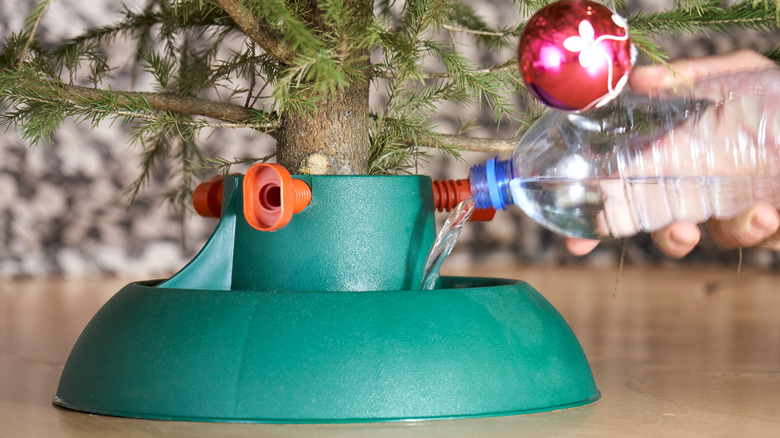Garden Trees, Shrubs & Vines
Lucy Clark
The process of picking out and setting up a real Christmas tree is a tradition many families cherish. While the maintenance portion of Christmas tree care is a little more involved than with an artificial tree, the look of the real deal is almost always unmatched, not to mention the lovely, seasonal pine smell that fills your home.
Real Christmas trees can be a little more challenging to clean up after, especially if the needles start to fall. Since you’re dealing with a live tree, there are complications like with any houseplant, except on a much larger scale. While a neglected houseplant may shed a few small leaves, a Christmas tree will start dropping lots of hard-to-clean-up needles. Curious pets or small children may also try eating the needles, which can cause throat or stomach obstructions, per PetMD, as well as general nausea and upset stomachs. Instead of constantly picking up fallen needles, learn how to prevent them from dropping in the first place.
Keep it watered

Georgy Dzyura/Shutterstock
As with any living plant in your home, you must keep your Christmas tree regularly watered – especially since it’s only relying on water instead of soil or roots to keep it alive. Home Depot says you should give 6-foot tall Christmas trees at least one gallon of water daily, adjusting more or less for larger or smaller live trees. A more specific rule of thumb, though, is to ensure the water isn’t lower than the tree’s base.
More than anything, make sure your Christmas tree is never left to dry out completely. Hicks Nurseries warns that the tree’s sap will create a hardened resin over the raw stump and prevent it from absorbing water. If this happens, you’ll have to cut a new stump, which will be incredibly difficult with lights, decorations, and presents. Finally, make sure to mist the needles daily, which keeps them from getting brittle.
Buy a fresh tree
Gorynvd/Getty Images
It won’t matter how much you water or mist your Christmas tree if it’s already too dry when purchased. As Your Indoor Herbs and Garden warns, an old tree will dry out to the point it can’t accept any new water, which means it will inevitably start rapidly dropping needles and decaying once you bring it home, not to mention become a significant fire hazard.
There are a few ways you can test your tree before buying it to ensure you’re getting a fresh one. Lowe’s says the first step is to shake the tree by its trunk. If any fresh-looking, green needles come off, move on to another tree. You also need to check out the needles themselves. They should be flexible but firm, and snap if you twist or bend them. They should not be hard, brittle, stiff, or any color other than a vibrant green. When they break, the pine needles should release a sticky sap. Finally, grab one whole branch and run it between your hands. A few needles may drop or shed, but if it’s excessive, the tree is too dry and old.
Move it away from vents and heat
Tom Merton/Getty Images
If you regularly water your tree and have a fresh, healthy plant, but it’s still dropping lots of needles, there may be another issue that’s drying it out and causing the problem. The biggest issue is sources of heat or air, per Prestige Air. A dry tree is already going to cause a headache and a giant mess of fallen branches and needles, but more than that, it can be a dangerous fire hazard and safety issue.
Furnaces, space heaters, fireplaces, or any other heat source will rapidly dry out your Christmas tree, no matter how much you water or mist it or how freshly cut it is. This is particularly dangerous, as the dry tree combined with ropes, paper, and electric wiring used to decorate your tree is the perfect kindling material. If a rogue spark escapes your fireplace, you could have a full-blown house fire on your hands. Placing your tree under or on top of a vent or fan is less dangerous, but it will still dry out your tree and may even damage your vent, too.
